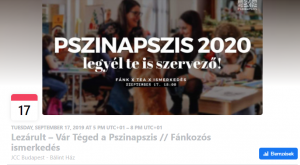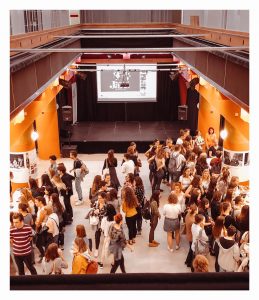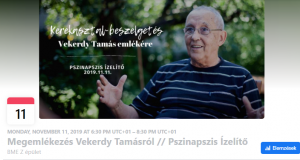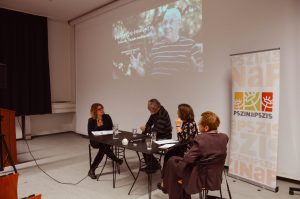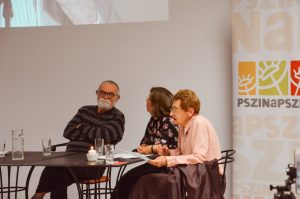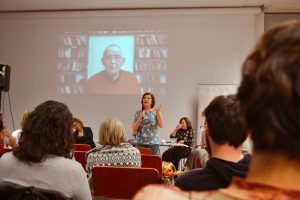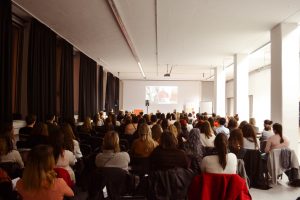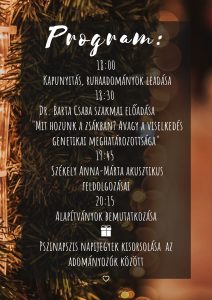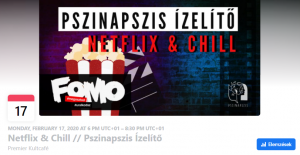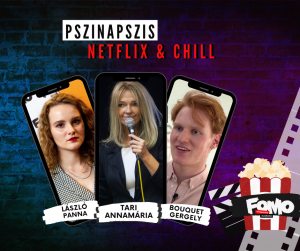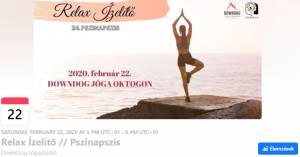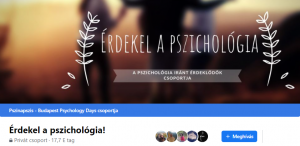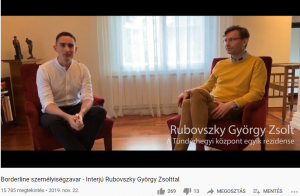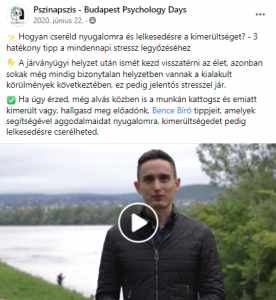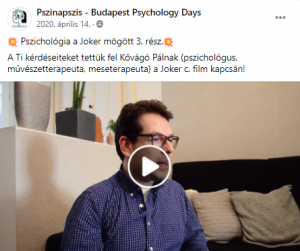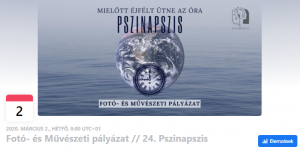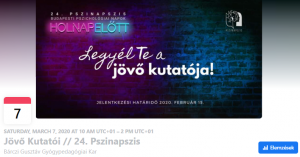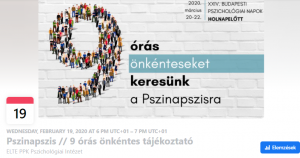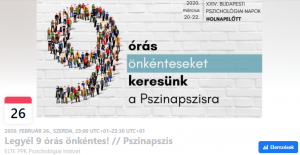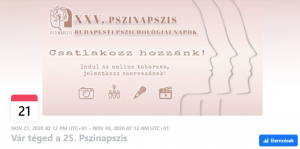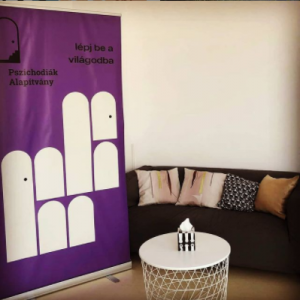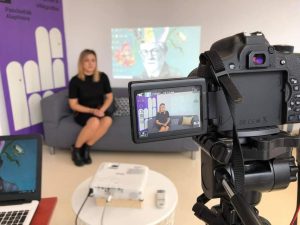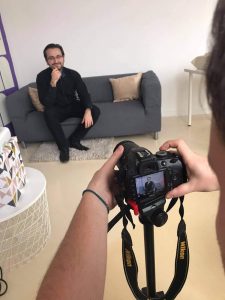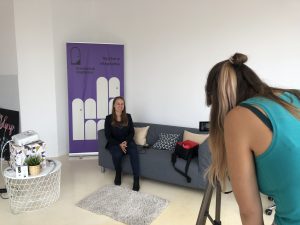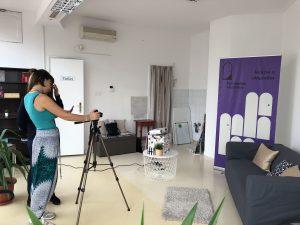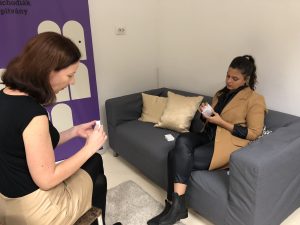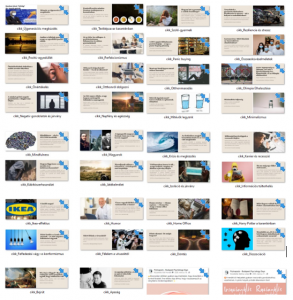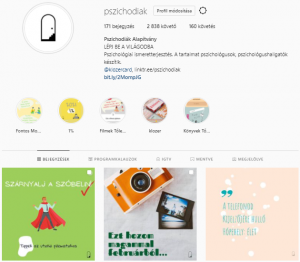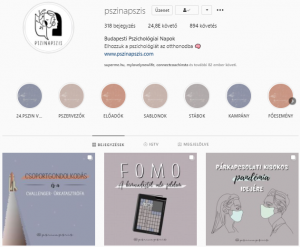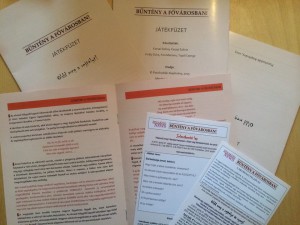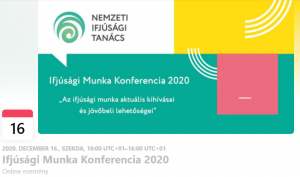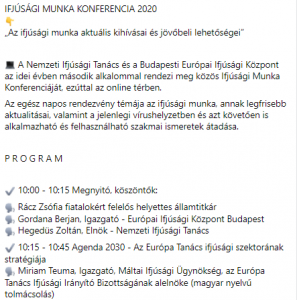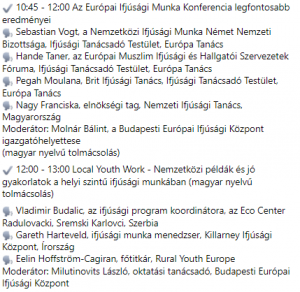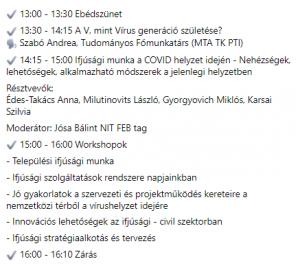Donations and last year’s activity
The donations we receive are used to disseminate psychological knowledge as widely as possible. We do this by organising awareness-raising events, training the psychologists of the future (through a volunteer programme, traineeships, internships, volunteer hostels), providing know-how, networking capital, providing them with practice and incubator opportunities for their first wing trials, and producing online content. Donations are used to cover the costs of these activities.
- 1%
- Activity and target group
- Improvement of the future’s pyschologits
- Awareness raising event: a Pszinapszis
- Psychoeducation
- Events before pandemic
- Online lectures
- Educational platforms
- Community building
- We are a volunteer hosting organisation for ELTE (Eötvös Loránd University)
- We are an internship partner for PPKE (Pázmány Péter Catholic University)
- National Youth Council membership
1%
The 1% donations so far have been used to cover the costs of the Budapest Psychology Days, our most effective awareness-raising activity to date, and have been used to rent the largest auditorium, which seats 500 people and allows the largest number of people to attend lectures by the most prominent figures in the field.
- Reporting obligation for 2020 is usually May of the following year
- Year 2019 1%: HUF 39 159, amount used in the year: HUF 39 159; donation from individuals or companies: HUF 0
- Year 2018 1%: HUF 48 604, amount used in the year: HUF 48 604; donation from individuals or companies: HUF 0
- Year 2017 1%: HUF 41 080, amount used during the year: HUF 41 080; donation from individuals or companies: HUF 0
Please see our financial reports on www.birosag.hu or download from our page.
Pszichodiák Alapítvány activities in the year of the COVID-19 pandemic
The work for our mission has not stopped, but it has changed significantly. We continue to focus on providing mental health psychology to the widest possible section of society and developing the next generation of professionals for possible interventions.
The activities of the 24-year-old Pszichodiák Foundation (pszichodiak.hu) are: dissemination of psychological knowledge, scientific and cultural activities, education, skills development for national, international and cross-border interested people; professional socialization of psychology students, community building. We work with about 70-100 volunteers per year. Memberships. Budapest Youth Council (2009- ), National Youth Council (2016-), ELTE volunteer host partner (2014-), PPKE intern host partner (2020-).
Target groups: (1) Society: aim: to promote psychological culture, to provide authentic information, to dispel misconceptions, to sensitize, to preserve mental health. (2) Volunteers: Aim: to activate young people, to raise awareness, to provide professional insight, to provide a network of contacts. (3) Community: Aim: to strengthen the community (through games, community events, projects).
The Psychodia Foundation’s operation and existence is based on the organisation of volunteers and community building. Our objectives are to take action for social mental health through the active contribution of young volunteers who carry out projects.
Traditionally, through our awareness-raising activities, our young volunteers develop their competences in practice, through the implementation of a major multi-day event, Psinapsis – Budapest Psychology Days (www.pszinapszis.com), learning by doing experiential learning.
This event is organised by the young volunteers, who acquire, step by step, a number of useful competences on the go, from event organisation to teamwork and skills that are also important for their professional identity.
The situation created by the COVID-19 pandemic in spring 2020 and the curfew restriction (12.03.2020) in this context meant that we had to reorganise our operations in 2020.
Activities for 2020 can be grouped into three broad areas:
- 1/ developing volunteers,
- 2/ adapting the event to the online space to adapt to the new situation,
- 3/ psychoeducation, awareness raising, online content production.
1/ Volunteers: developing the psychologists of the future
A specific feature of our activity is that the large self-study team is made up of students who fluctuate from year to year. Our aim is to develop their competences in a versatile way. Their selection, preparation, coordination and team-building required different methodologies.
Initially, the Foundation and the more experienced organisers worked together in teams (pooling experience, knowledge transfer, planning, objectives). From them and their suggestions, the main staff was formed. The few months starting in May 2019 were dedicated to joint discussions and team-building activities.
In autumn 2019, the selection of the entire organising team (around 70 people) took place following an in-person and online recruitment event. The recruitment event was interactive, with questions, the objectives and the main tasks.
The team, which will be assembled in the autumn of 2019, was given an orientation and a team-building session with training methodology elements before starting their tasks. The volunteers carried out the organisational tasks in weekly team meetings, during which their communication and cooperation skills were indirectly developed. Occasionally, longer, marathon staff meetings took place, with joint planning, pizza or sandwich lunches. Their enthusiasm has also had an impact on encouraging other students to volunteer, with new recruitments and applications (e.g. art, research).
Informal meetings were also held regularly to strengthen group cohesion. Weekly staff meetings were also led by more experienced psychology students. This was of great help in resolving possible communication misunderstandings and conflicts and in creating a motivating group atmosphere. However, this team-building approach really became indispensable in the context of the pandemic in spring 2020, when the organisers were forced to cancel the event a week and a half before the planned date, beyond the workload. They expressed their uncertainty, disappointment and despair, losing motivation and finding their place in the project less and less. However, the supportive attitude of the project leaders helped the majority of them to overcome their depression and the tension caused by uncertainty, and most of them stayed with the project until autumn 2020 with extended participation.
By the summer of 2020, the organisers had (also) gained new momentum and inspiration thanks to the group’s staying power and found online platforms as a channel for communicating their commitment to the community. They posted longer professional writings and articles on pszinapsis.com and became more active on Instagram, which was able to rebuild team unity. Building on the experiences of the volunteers who organised Psinapsis and the Psinapsis follower base, the Deep Air Project was also launched in Spring 2020.
By the autumn, our volunteers were faced with a completely new situation requiring a different infrastructure, which was not helped by the experience of previous years. On the other hand, the second postponement of the personal event in autumn 2020 due to the epidemic wave in the autumn brought an almost complete replacement of the organizing team, so methodically for the staff leaders, this autumn period was about closing the group processes, mitigating possible failures and recruiting, selecting, training, entering the project and transferring knowledge to new organizers. In the autumn of 2020 (October-November), the old organisers were replaced by new organisers at the end of the project, after a period of double the time, exhaustion and uncertainty due to the epidemic situation, and a recruitment session and a smooth entry into the project had to be organised for them.
2/ Awareness raising event: a Pszinapszis
In addition to the development of volunteers, the focus of our activities was to disseminate psychological knowledge as widely as possible, and to achieve this goal, we organised the Budapest Psychology Days (Pszinapszis), the related planning and preparation processes, and the project management itself. Over the past few years, the three-day event has become a festival of psychology.
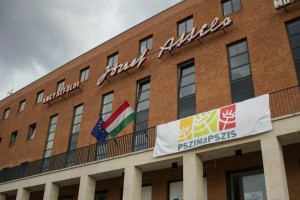
Its diverse and varied programmes attract thousands of visitors from all over the country. In addition to the main staff, which has been in place since May 2019, a significant number of volunteers joined the project in autumn 2019. They have acquired the necessary event management skills partly through knowledge transfer and coaching in weekly staff meetings. These were initially face-to-face and later, due to the epidemic situation, online (e.g. using Zoom, Google Drive).
On the other hand, competences were developed through practical training. The main approach of our activities was that new organisers could learn the basics from the very beginning, with the help of their more experienced colleagues, “on the job”, through their own experience, by carrying out tasks with real professional and financial responsibility. Continuous development took place through the organisation of a series of smaller sub-projects (e.g. mid-year events, Advent fundraising for the needy, round tables, online broadcasts, film screenings, yoga occasions) before the big event in March 2020. This allowed volunteers from all areas (professional, cultural, on-site, logistics and PR/marketing) to try their hand “in a small way”, while the main staff also developed their leadership skills.
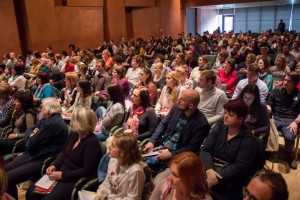
During the process, we used the usual project planning tools (brainstorming, mind map, SWOT, risk analysis, needs assessment with market research, objectives, indicators), while in the implementation we used project management methods to conduct team meetings, monitor tasks, and manage internal and external communication (with team members, suppliers, partners, speakers, audience).
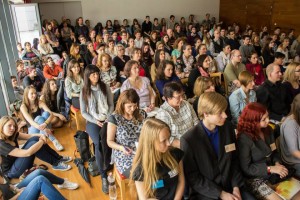
The different event elements (lecture, workshop, round table, civic street, relaxation programmes, live library, tea house, book house, exhibition, slam poetry, team building) required different event management skills (e.g. venue booking, sound system, technical implementation of live broadcast, audience relations, protocol). The epidemic also enhanced the organisers’ competences in the field of crisis communication and crisis management.
The development was complemented by more formal knowledge transfer in addition to experiential learning. The old organisers shared their know how in the context of the meetings. In addition, two organisers attended a communication training where they learned the basics of press events, press and media relations and public relations, and the professional staff attended a training on public speaking techniques where they acquired and passed on public speaking skills (presentation, statements) to their fellow volunteers.
By March 2020, everything was going according to plan, with the Foundation and the more experienced organisers working together in teams to summarise experiences and define plans and objectives. The main staff was established. The first few months of the project were dedicated to joint discussions and team-building activities.
Various pre-events were also organised (project launch, team-building sessions, recruitment sessions in several phases, preview presentations and programmes, advent, regular face-to-face staff meetings, press communication training with the participation of two delegated volunteer organisers, and training in speaking techniques and speech development for the professional staff presenters, as well as knowledge transfer and several internal training sessions provided by the more experienced organisers. The work was coordinated by the staff leaders, with the supervision and support of the Foundation and a support staff of former organisers.
With the introduction of the curfew in spring 2020 (12.03.2020), we had to cancel our biggest “attraction”, the big event itself, as the planned date (20-22.03.2020) would have been after the announcement of the restrictions and the escalation of the epidemic situation. However, the originally planned date of the event (20-22 March 2020) had to be changed, as no event could be held due to the restrictions imposed by the March 2020 pandemic.
In the spring, we hoped that the Pszinapszis would be able to take place in the autumn as usual, so the volunteer team initially planned to postpone the event to a date in early October (02-04 October 2020). This required unpredictable extra work from the team, with volunteers spending double their originally agreed self-directed time on their tasks.
However, the possibility of a second wave in autumn 2020 made it uncertain whether the event could be held on the revised date (2-4 October 2020), and required further reorganisation.
Finally, the event could not be held in person during the second wave of the epidemic and had to be moved to the online space, where the recording of the lectures started in autumn 2020, coordinated by the 24th Pszinaspszis team. Following the cancellation of the event in the autumn and the departure of the team, filming had to be taken over by the 25th Pinsyap organizing team. Work is ongoing on the organisation of the filming and online programmes, and the team is constantly coming up with new online content. We have been able to hold several of the meetings and filming sessions in person, albeit on a different schedule than originally planned due to the epidemic situation and restrictions.
The persistence of the epidemic situation prompted us to increase our online presence in our outreach activities in order to achieve our initial objectives, but the experience of organising events in a “traditional” face-to-face setting over the years was not applicable. Volunteers needed to gain experience in new areas that they had not previously experienced and also to reach out to the public on new platforms. A large part of the presentation topics were produced as online content, while others were produced as online presentations. The content was published on social media platforms (Instagram, Facebook group, YouTube channel, Webuni, etc.) and is still being uploaded.
3/ Psychoeducation, awareness-raising activities
Keeping in mind the educational and professional socialisation objectives of the Foundation, the volunteers learned project planning, management, teamwork, professional but accessible information transfer methods during the implementation of the event and the online content production.
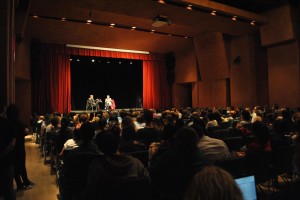
During the year 2020, the Foundation’s volunteers wrote longer professional articles and articles on psinapsis.com and became more active on Instagram.
They researched the scientific knowledge from credible sources (e.g. scientific journals), produced short, draft transcripts and finally translated it into text, graphics or video (using graphics and editing software). The tasks were carried out individually or in pairs, sharing the work phases and discussing the solutions in groups.
By researching topics and speakers, their professional insight and processing skills were strengthened in presentation, science communication and transformation, their technical skills (graphics, video editing) in execution, and their public relations and marketing skills (comments, polls, running insta stories) in publication.
Beyond the project, they will also be able to use all this in their future work, their individual practice (own website, channel) and their future academic career (doctoral research).
The first development was the Psychoapse Instagram, which after several years of presence received more attention during the epidemic, when the role of psychological content and lifestyle advice was enhanced. Based on the experience gained here, the 24th Pszinapszis also launched the Deep Air Project, which focuses on the treatment of anxiety and depression, and the provision of information on these topics, through the event’s channels, which by then had already reached tens of thousands of people.
In addition to the instagram platform targeting young people, the Pszinapsis volunteers now have a TikTok profile, where they promote the importance of mental health through popular videos.
Pre-pandemic events: some of the learning-by-doing activities of the 24th organising team:
2019.09.17. Volunteer recruitment opportunity
https://www.facebook.com/events/2419464148375199/
We were still able to personally organise the recruitment event for the project in autumn 2019.
2019.11.11. Round table discussion in memory of Vekerdy Tamás
https://www.facebook.com/events/784464448676888/
In preparation for the event, the volunteers organised presentations, round tables and other activities, where they prepared for the smooth running of the event on the ground by learning by doing, by implementing small projects.
The first such event of the autumn was triggered by an unfortunate incident. A round-table discussion in memory of Tamás Vekerdy was organised in the evening, and the public was able to attend in person.
2019.12.02. Fundraising: Adventi Cavalcade x ELTE PPK
https://www.facebook.com/events/737639110047537/
In the run-up to Christmas, the volunteers organised an Advent evening called the Advent Cavalcade. The programme not only served as a festive mood, but also as a way of social responsibility and sensitisation. The donations received were distributed to people in need (foster home participants, residents of maternity homes, hospitals).
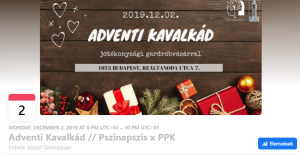
Mid-Year events
Visitors also had the chance to sample the types of events put together by volunteers in early 2020. These taster programmes not only offer a range of scientific lectures and round-table discussions, but also cultural and leisure activities with a festival-like atmosphere.
In early 2020, visitors could attend a film screening with a discussion and a yoga programme. An important element in preparing the volunteers is that these programmes require a slightly different preparation from the performances, and so the volunteers had the opportunity to develop this during the project.
2020.02.17. Netflix & Chill
https://www.facebook.com/events/2551984628412114/
2020.02.22. Yoga
https://www.facebook.com/events/587304905003941/
Online LECTURES
The other part of the presentations and lectures were published online, partly in the Facebook group “I am interested in psychology”, which was created by the volunteers of the Foundation and currently has more than 17000 members (https://www.facebook.com/groups/1071136943056334), and partly on our YouTube channel “Psychinapsis – Budapest Psychology Days”, also run by our volunteers. (https://www.youtube.com/channel/UCDLDvZ3hYtqDnSih-WHTJAg),
ExAMPLES ON ONLINE LECTURES, videOS:
Encouraging young people, promoting volunteering
Volunteers also organised competitions and programmes for community building and motivation
during the duration of the project. These included an art exhibition with the theme of the event, the opportunity for young researchers to participate in the Future Researchers section of the event, and a Slam Poetry competition on site.
They also wanted to motivate more young people to volunteer, so a few weeks before the event, the organisers held recruitment and training sessions for young people who would like to get a taste of the on-site activities, volunteering and the atmosphere of the event for just a few hours.
2020.03.02. Art competition
https://www.facebook.com/events/2770784236333723/
2020.03.07. Future Researcher competition
https://www.facebook.com/events/137529473932113/
2020.02.19. és 2020.02.26. Volunteer recruitment opportunity
https://www.facebook.com/events/246736029674115/
https://www.facebook.com/events/605242736994132/
2020.11.21. Volunteer recruitment opportunity (online)
https://www.facebook.com/events/3301040296684743/
Recording presentations, filming
In view of the 2020 pandemic, we have gradually moved our events and presentations to an online platform. Video recordings of the lectures previously given in person have been made in the office where we hold our meetings from October 2020 onwards, and will be published online on a continuous basis after editing and cutting.
Currently published content:
Limpár Imre:
https://www.facebook.com/pszinapszis/posts/3809947129065500
Educational informations:
https://www.facebook.com/events/1043644299476765/
https://www.facebook.com/pszinapszis/posts/3825608710832675
https://www.facebook.com/pszinapszis/posts/3837629082963971
Tari Annamária:
https://www.facebook.com/pszinapszis/posts/3898552440204968
Herner Dorka:
https://www.facebook.com/pszinapszis/posts/3903951362998409
Stánicz Nikolett:
https://www.facebook.com/pszinapszis/posts/3937113463015532
Round table on the stigma of mental disorders:
https://www.facebook.com/events/1625740307635837
Online content production:
We have also moved our outreach activities to an online platform in view of the 2020 pandemic. We have created daily posts on Instagram, the platform used by our target audience, to provide professional knowledge in a scientific but accessible, magazine-style format. The Pszinapszis platform was active throughout the volunteering activity, and the Mélylevegő Project, formed from the Pszinapszis organisers after the cancellation of the in-person event, also posted content continuously. Since autumn 2020, the Foundation has also been running an Instagram channel. On all three platforms, we have also tried to build community through various interactions and activities (e.g. Instagram Story). We have also published longer, professional writings by volunteers on the event page at https://pszinapszis.com/irasaink.
Writings and articles by volunteers (https://www.pszinapszis.com/irasaink) (2020)
Online educational activity on Instagram (2020)
Community building
A community- and relationship-building card game designed by psychologist Klozer, with short questions focusing on personal experiences to get closer to knowing others and thus oneself.
Our volunteers run the Facebook group “I am interested in psychology”, which they created and which currently has more than 17000 members, not only professionals. (https://www.facebook.com/groups/1071136943056334).
Volunteer hosting partner of ELTE
The main objective of the career management courses at Eötvös Loránd University is to support the entry of the University’s students into the labour market. The Higher Education Act gives students the opportunity to earn part of their credits on a voluntary basis. At ELTE, a model has been developed with the Directorate of Education where volunteering is implemented through an optional course.
Volunteers are either involved in the daily activities of the course according to their field of expertise, interests and development plans, or they participate in the implementation of independent projects.
Internship partner of PPKE
We offer internship opportunities for MA students in psychology at Pázmány Péter Catholic University. Our mission is to train the psychologists of the future (through a volunteer programme, internships, internships, volunteer hostels), to provide know-how, networking capital, practice and incubation opportunities for their first attempts at winging their way.
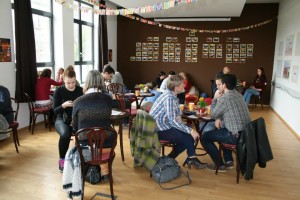
National Youth Council member from 2016
Most recent collaboration: the Youth Work Conference 2020 roundtable discussion with the president of our foundation, Szilvia Karsai
2020. DECEMBER 16.
https://www.facebook.com/events/684188838965380
